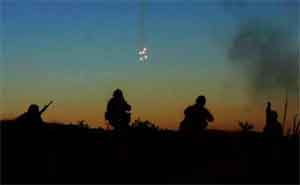Operation Plymouth Rock comes to a close

As the sun sets, Marines of the 24th Marine Expeditionary Unit mark their position with a white star cluster to alert friendly forces of their position during a firefight in Jurf as Sakhr, Iraq, Dec. 1. The firefight erupted when insurgents fired on Marines as the Marines conducted a cordon-and-search mission through the town.The Marines are from Bravo Company, Battalion Landing Team 1st Battalion, 2nd Marines.The mission is part of Operation Plymouth Rock, the latest offensive by Iraqi, U.S. and British Forces aimed at rooting out anti-Iraqi elements in northern Babil province.Photo by: Lance Cpl. Zachary R. FrankOperation Plymouth Rock Ends In Northern BabilMarines encouraged by the performance of the Iraqi National GuardDec. 3, 2004 Forward Operating Base Kalsu, Iraq -- A nine-day offensive aimed at flushing out insurgents south of Baghdad ended Wednesday with the capture of 21 suspects in a series of raids by Iraqi security forces and U.S. Marines.The campaign, an intensification of efforts underway in the region since August, involved some 5,000 Iraqi, U.S. and British forces and followed closely the retaking of the insurgent stronghold of Fallujah earlier this month.The long-term impact of Operation Plymouth Rock is still being assessed, but Marine leaders are confident that the capture of 204 suspected militants and the discovery of 11 arms caches has caused serious near-term disruption to insurgent activity here."The success of this operation, like many others before it, is a testament to the resolve that Iraqi and Multi-National Forces have shown and will continue to demonstrate," said Col. Ron Johnson, commander of the 24th Marine Expeditionary Unit, which led the operation."Insurgents can look forward to more of the same in the near future, especially with the growth and proficiency of the Iraqi security forces," he said.The idea behind Plymouth Rock was to sustain the momentum achieved in Fallujah by aggressively targeting militants in southern Baghdad and northern Babil province. Marines believe that an undetermined number of insurgents slipped out of Fallujah before U.S. forces had cordoned the city off, skirting south using a number of well-established "rat lines."A British battle group was redeployed from Basra to northern Babil to help seal off the escape routes along the Euphrates River, west of Lutafiyah. With Marines already in position to the east and south, the allies began to squeeze the insurgents inside their increasingly vulnerable sanctuaries.Still, the area is sizeable, and insurgents here have long preferred to hit and run rather than stand and fight. Armed with carefully cultivated knowledge of the local threats, Iraqi and U.S. forces have been chipping away at the problem with targeted raids. Success has often come one or two insurgents at a time.On Nov. 23, the first day of the latest offensive, the Iraqi SWAT team and elements of the 24th Marine Expeditionary Unit raided a number of targets in Jabella, about 50 miles south of the capital. The joint force captured 32 suspected insurgents.While the contribution made throughout the week by the elite Iraqi SWAT team came as no surprise, Marines were most pleased with the role played by the 507th Iraqi National Guard Battalion.ING soldiers led several of the operations, including a Nov. 27 raid in Musayyib that netted five suspected insurgents and a pair of raids in Lutafiyah and Mahmudiyah Nov. 30 that picked up five more.Despite a concerted campaign of intimidation and terror that has cost dozens of ING soldiers their lives, the 507th is showing impressive resilience.By the time Plymouth Rock had ended, Iraqi, U.S. and British forces had rounded up 204 suspects in 21 operations that included raids, house-to-house searches and citywide sweeps. (A slightly higher number of detainees reported Wednesday did not reflect the release of several of them in recent days.)In addition, having repeatedly scoured the farmers' fields along the east bank of the Euphrates, Iraqi, U.S. and British forces uncovered 11 arms caches, turning up a large supply of the tools insurgents are using to target pro-Iraqi forces. (See attached for a full summary of munitions seized and subsequently destroyed.)In particular, Marine analysts believe local insurgents will miss seven stockpiles seized in Yusufiyah, where a recently established Marine patrol base has frustrated insurgent attempts to find sanctuary there.While Plymouth Rock is finished, the pursuit of insurgents south of Baghdad continues. MNF commanders have no intention of yielding the initiative."Each and every day we are learning more and more about those participating in insurgent activity, and we are tracking them down one by one," said Johnson. "No quick fix is envisioned. The solution lies in patience, persistence and sustained presence."Weapons and Ordnance SeizedOperation Plymouth RockNov. 23 - Dec. 1(1,243) artillery rounds(115) rockets(3) rocket fuses(3) homemade rocket launchers(6) 122 mm rocket warheads(1) mortar base plate(1) 82 mm mortar system(60) empty crates for 82 mm mortar rounds(602) mortar fuses(3) mortar sights(3) large aircraft bombs(3) complete mortar systems(11) surface-to-air missiles(2) surface-to-air missile launchers(8) miscellaneous projectiles(1) rocket motor model(26) improvised limpet mines(1) 100 kg bomb(39) rocket-propelled grenades(14) RPG launchers(3) RPG sights(63) RPG propellant charges(29) hand grenades(2) flash-bang grenades(25) grenade fuses(5) machine guns(23) AK-47 rifles(5) RPK rifles(2) Dragunov sniper rifles(28) 115 mm tank main-gun rounds(4,000) rounds of 7.62 mm ammunition(15) cartridge belts(15) electric blasting caps(1) 100-foot time fuse(2) doobell initiators(3) phone initiators(6) remote keyless entry initiators(1) phone charger(1) thermal battery(2,750) feet of detonation cord(10) pounds of explosives(1) canister of CS incapacitating agent(2) bags full of propellant










0 Comments:
Post a Comment
<< Home